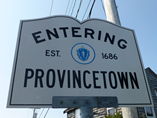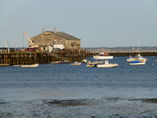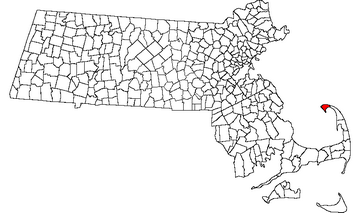    |
ProvincetownNickname: "P Town"
Official Website: www.provincetown-ma.gov
County: Barnstable
Region: Cape Cod (Outer Cape)
Year Settled: 1700
Incorporated as a Town: 1727
Land Area: 9.7 sq. miles
Population Density: 355 people/sq mile
Population from Census 2000: 3,431
Estimated Population for 2006: 3,415
Racial makeup of population: [+] show
| 86.1% | White | | 7.4% | Black | | 2.2% | Hispanic | | 0.5% | Asian | | 0.2% | Native American | | 3.7% | Other |
Median Housing Unit Value in 2000: $317,000
Median Single Family House Sale Price in 2006: $530,000
Poverty: 16.3%
Violent Crime Index: 13 (low)
Property Crime Index: 61 (high)
Known For: LGBT community, Gay bars, Drag shows, Artists, Commercial Street, MacMillan Pier, Fishing, Boating, Whale Watching, Sand dunes
Main Attractions: Commercial Street, Cape Cod National Seashore, Pilgrim Monument & Provincetown Museum, Province Lands Visitor's Center , Whydah Pirate Museum, Art Galleries, Art's Dune Tours, Whale watching, Charter boat fishing, Bicycling, Portuguese Festival, LGBT Festivals and Events
Beaches: Race Point Beach, Herring Cove Beach
Provincetown, Massachusetts, or "P-town" as the locals know it, is well-known as a big tourist destination for gays and lesbians. It is also known as the place the Pilgrims first landed in 1620. The Pilgrim monument is a reminder of that and is the best known building on Cape Cod. During the 1600s to 1800s Provincetown was mostly a fishing village. Whaling was also a big business over a century ago and today, although whales are no longer hunted, you can go on whale watch boat trips which leave MacMillan Wharf daily in summer. At the turn of the 20th century there were many fish packing plants being built along the shores. These are all but gone today. There used to be many Portuguese fishermen living here and there are still a few restaurants and bakeries serving Portuguese food.
During the early-1900s, as the fishing industry subsided, many artists and tourists came to Provincetown and it became an art community filled with studios, art galleries, and theaters. There are still many here today such as the Provincetown Art Association and Museum. The 1960s to 1970s saw the influx and acceptance of many hippies and homosexuals. Provincetown became the LGBT-friendly community it is today with many gay bars, tea dances, rainbow flags, gay cabaret and drag queen shows. The town hosts several annual gay and lesbian events, and also a Portuguese festival in late June.
Commercial Street is the town's main street where one can find abundant shops, restaurants, bars and clubs, and inns. Although it is open to vehicular traffic, in summer there are so many tourists walking and riding bicycles that it is almost impossible to drive down the Street and parking can be hard to find although there are lots available.
Tourist Attractions In Provincetown, MA
Best Places To Eat In Provincetown, MA
Compiled January 2, 2014
10 Best Restaurants in Provincetown for Dinner
Honorable Mention
7 Best Restaurants in Provincetown for Breakfast
10 Best Restaurants in Provincetown for Lunch
4 Best Places in Provincetown for Ice Cream
|

|
|
 Fun
In
New
England
- Massachusetts
Fun
In
New
England
- Massachusetts
 Fun
In
New
England
- Massachusetts
Fun
In
New
England
- Massachusetts